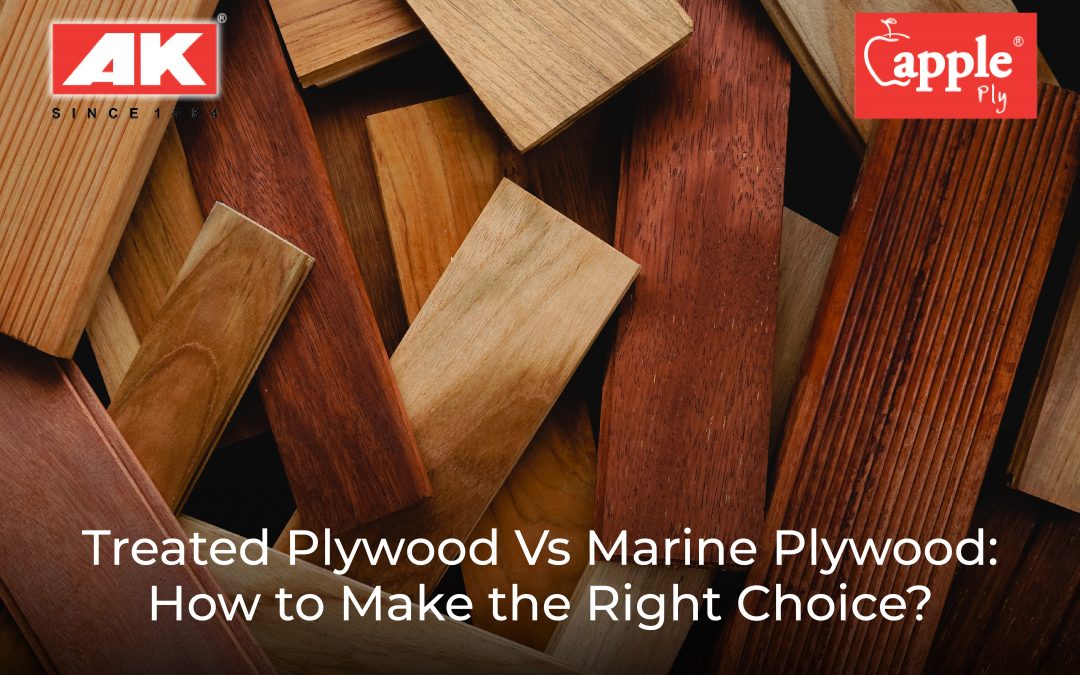Plywood is a material manufactured from thin layers or ‘plies’ of wood veneer that are glued together with adjacent layers having their wood grain rotated up to ninety degrees to one another. There is a wide variety of choices when it comes to plywood due to the difference in their manufacturing process that makes them suitable for different use cases and applications. One of the two most opted for and widely confusing decision is the choice between treated plywood vs marine plywood.
Marine Plywood and Treated Plywood are both equally popular options. However, one must bear in mind that the application of each of these varieties greatly depends on their individual properties, which are unique in nature.
Looking for advice on how to choose wisely? Do you want to make a decision that is well-informed to help meet the demands and specifications of your project?
Well, you’re at the right place!
This article will walk you through the various properties of both treated and marine plywood, leaving you with a thorough understanding of the benefits, characteristics, pricing and other aspects that will equip you to make the right decision.
Let us begin by understanding the defining features of Marine Plywood and Treated Plywood as summarized below.
What is Treated Plywood?
Treated plywood refers to a regular plywood sample that has gone through a special chemical process wherein chemicals are mechanically injected into the wood, making it more durable and less prone to decay, insect damage, fungus, bacteria, weather damage and more. It can also survive exposure to average amounts of water.
What is Marine Plywood?
Marine plywood is a durable, high-quality product that can withstand regular rain, snow, and moisture. Marine plywood is not chemical treated, unlike Treated plywood.
Rather, marine plywood’s thin veneer sheets are glued together in a cross-laminated manner using waterproof glue, pressure, and heat. The result is increased strength to the wood.
Treated Plywood Vs Marine Plywood: Let Us Compare!
| Property | Treated Plywood | Marine Plywood |
| Appearance | Rougher and not as refined as Marine Plywood | The superior quality wood veneers contribute to a sleek and better looking appearance. |
| Flexibility | Very flexible | Not as flexible as Treated Plywood |
| Strength and Durability | Treated Plywood has a lot more gaps and voids making it more susceptible to warp or delaminate under harsh conditions. | Higher quality wood with fewer gaps and voids makes it is a lot stronger and more durable. |
| Versatility | Can be used for multiple projects because of how easily available and inexpensive it is. | Can be used in moisture-dominant areas, but is not recommended for use in all types of projects because of how expensive it is. |
| The Requirement of Safety Gear | Gloves and Masks are required to minimize contact since the plywood is chemically treated | Safe to handle without a mask and gloves since there are no chemicals involved |
| Affordability | Treated Plywood’s price can fall anywhere between – and -.*These prices are subject to change depending on the market value | Price for Marine Plywood ranges from – to –*These prices are subject to change depending on the market value |
Conclusion
Marine plywood and Treated plywood are the most commonly used wood types today but the difference in their manufacturing process makes them suitable for different applications based on their flexibility, surface and number of layers. Marine plywood could be used for structures that might see a significant amount of moisture exposure over time. Treated plywood can be used almost anywhere except where the surroundings are such that they do not affect the chemically treated wood.
Overall, It is tough to pronounce one as being better than the other since both have their pros and cons. Ultimately, the choice comes down to careful consideration of the requirements, surrounding environment and associated risks.
AK Ply is one of the best plywood companies in India and a great place to start if you are looking for high-quality plywood. We have a wide selection of products suitable to your requirements and we ensure an uninterrupted supply as well. Get in touch with us and we’ll help you pick the right plywood.




